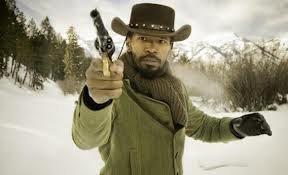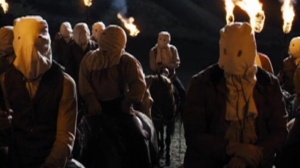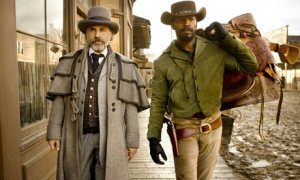
Well, I finally got around to watching “Django Unchained” the other day. I’m probably the last person to have seen the film, and I did so reluctantly (and illegally, at that). After several months of reading articles that had nothing good to say about the movie, I figured it was time I do my own research and go to the primary source by watching the movie myself–and then [shamelessly] dedicate a blog-post to my findings!
As an African American, I found the film offensive for so many different reasons. Not that I wasn’t aware that feeling this way after watching a western film based around slavery could be a possibility, but now that the film has been nominated to win an academy award, I think it is crucial we really see and understand why this movie, along with its success, is perpetuating a problem that has too long existed within Hollywood–African Americans being poorly represented.
In an interview after winning a Golden Globe, Tarantino was confronted over his abundant use of “Nigger” being tossed around pretty liberally throughout the film–somewhere around 110 times. His response: He wasn’t using it anymore than they used it in 1858. Now if historical accuracy is what he uses to justify the use of the word, than historical accuracy should be a consistent theme throughout the movie. But instead, we see the film flooded with historical inaccuracies. Just to name a few:
1. In the beginning of the film, Dr. Schultz, after shooting one of the slave catchers, claims he has five witnesses (slaves) who can testify to the fact that he was defending himself. In 1858, Blacks weren’t considered citizens, and as such, they couldn’t testify in court, even if they were freeman.
 2. The Ku Klux Klan never existed during slavery. The whole premise of their existence was to create a new force to keep blacks subversive since slavery had been abolished.
2. The Ku Klux Klan never existed during slavery. The whole premise of their existence was to create a new force to keep blacks subversive since slavery had been abolished.
3. There was no Mandingo fighting plantations. In fact, slaves never fought to the death for entertainment. They were too valuable and the strongest were used for useful purposes–tobacco and cotton production–purposes that could generate real profit. After all, that is why slavery existed–for profit, to fuel the economy and a market revolution in America.
Tarantino doesn’t get to justify his use of the n-word with historical accuracy while he so clearly doesn’t stay true to history in so many other regards throughout the movie. Black America has a right to be offended over these contradictions. We have a right to feel disrespected when someone white wants to manipulate our ancestry’s past to become enjoyable to watch. We have a right to be angered when the [white] mainstream sees this movie as a success in conquering racism in America by giving us a black “hero”. All of these responses–along with the movie itself–aren’t a symbol of how far we have come, they represent how far we haven’t come.
To be fair, I felt the film was a success in many ways. Tarantino really went in on this one. Cinematography, directing, acting, and action sequences were all great to watch. I’d be lying if I said I wasn’t more than a little bit entertained while watching this movie.
But that’s the underlining problem–the movie was entertaining. Tarantino claims that his intentions in this film are to depict slavery accurately, and in no way was the institutional enslavement of millions meant to be turned into a spaghetti western for our enjoyment and for someone to make millions off of. This film does no justice to educating people on what slavery was: a horrible institution that could come no where close to be entertaining if one stayed true to history. Rather, it’s an over romanticized version of slavery from the eyes of Tarantino, a white man.
A lot of people question why accuracy matters. Whats wrong with making an entertaining movie that doesn’t stay true to the facts? Its not like it hasn’t been done so many other times before by Hollywood. That’s true, but when it comes to the representation of African Americans and our history within Hollywood, accurate representation has been minimal. Despite taking up a greater part of American history, movies based around slavery are few, and so many people are still oblivious to the details and facts behind the racist institution.
But not just slavery, what about African Americans? So seldom do we see African Americans–or our history–in films. When we do, their roles are either minimal or secondary, and our history generally revolves around–or told from the perspective of–white folks. “Django” being no exception. Django’s character is more of a sidekick who gets his “five minutes of fame” at the end of the movie. His freedom, his ability to purchase his wife, and even his skills as a bounty hunter are all predicated on the relationship he has developed with a white man–which seems to be an extremely paternal relationship.
 So often in Hollywood do we see the “black sidekick” or the paternalism underlying black-white interactions with one another (anyone remember “The Help”). So based on Hollywood’s track record when dealing with racial matters, “Django” doesn’t really surprise me, but that doesn’t let them off the hook.
So often in Hollywood do we see the “black sidekick” or the paternalism underlying black-white interactions with one another (anyone remember “The Help”). So based on Hollywood’s track record when dealing with racial matters, “Django” doesn’t really surprise me, but that doesn’t let them off the hook.
To all those who could care less about historical accuracy and more about being entertained: that way of thinking is costly. It perpetuates the degradation of black actors/actresses. It leaves no room for meaningful dialogue on black misrepresentation. It allows blacks to narrowly be cast into the same roles we have become so used to seeing. Roles that don’t adequately represent the diversity of the black community, but that rather perpetuate stereotypes that have far too long existed in Hollywood.
Tarantino claims he was trying to give blacks a western hero we have long deserved but never had.
Maybe African Americans do need a hero to call their own, but that ain’t Django.
AMEN!
Dear Blogger,
I disagree with your argument, and I think your examples should be reexamined.
Just because Tarantino justifies the use of the word nigger by citing historical relevance does not mean he needs to be historically consistent. He never said he would be consistently historically accurate. He’s putting the use of the word in a specific context, but, as an artist, he shouldn’t be limited to that context. We’ve learned from his last film that he may be conspicuously historically inaccurate. It’s his artistic choice, and it’s not unreasonable.
Since I don’t agree with your general argument that Tarantino needs to keep the details of his film historically accurate, I don’t accept your following points of proof of anything. However, I found them problematic in other ways. Your first point is that the five slaves can’t be used as witnesses. They weren’t. (The fact that Dr. Schultz–a foreigner who disdains the slave trade *pointed them out as witnesses* doesn’t make it legal. The simple explanation is that Schultz didn’t know that.)
Your second point is that the Ku Klux Klan didn’t exist during slavery. The Ku Klux Klan is never mentioned in the movie. (The raiders on horseback, are simply raiders on horseback.)
Your final point–that Mandingo plantations didn’t exist in real-life–gets back to my first point. Tarantino is a fiction-writer. And, as far as screenplays go, he’s a great one. He is not obligated to tell the whole truth and nothing but the truth. If he wants to use the word nigger 110 times in his film, the question we should ask is “does it serve the film?” It does. It was believable, it kept us on edge and it worked as a device for revealing evil in his characters. If he wants to invent Mandingo plantations, the same line of questioning applies.
I think you got hung up on the film before you saw it. You clearly have other issues affecting your ability to accept the full value of the film. And I don’t blame you. Being an African-American is tough as shit, and you don’t get to be an adult without going through a lot of crap. But you need to think clearly about what you’re upset about. Just because Tarantino defends his use of nigger by pointing out the historical relevance does not mean he doesn’t have license to invent Mandingo Plantations. And just as he knows Hitler didn’t burn to death in a movie theater in France, he knows the history of the KKK and the value of a black man, 2 years before the Civil War.
t’s Tarantino though, not your typical hollywood director. It is not supposed to be historically accurate just like Inglorious Basterds.
Wow, marvelous blog layout! How long have you been blogging for?
you make blogging look easy. The overall look of your website is great,
let alone the content!
thanks, brother! I’ve been blogging for about 4 months now.
Mtali?! I did NOT realize that was you! Oh, man. my bad.
Yo I liked the film, I think i vibe with wat Damian was saying. I also thought that aside from the overs-saturation of racial epithets, the gross and intentional historical inaccuracy, and overly ridiculous plot that the film served the purpose of creating, although some might say quite controversially, a space in which the general public (and by that i predominantly mean white folks) can engage with a story of slavery that is both real and fictional, that is both ridiculous and at the same time quite serious.
The scene where him and his wife are being chased through the woods on the run illustrates this well an was prolly my favourite scene and why I enjoyed the movie.
As someone who is not black, there are very few opportunities in which you are able to see or fully understand the reality of what it is like to be black, to be a runaway, to be in constant fear of your life and those that you love and at the same time be unable to escape because everywhere you go there is punishment and death.
That scene is prolly the closest that a large portion of the white audience will ever get to knowing that feeling. Dont get me wrong, books and documentaries are great and so are films like Amistad, but why this was fascinating is because a scene like this was covertly inserted into a spaghetti western about a black man which was portrayed as comedy. Way to engage the public, who by an large either don’t regularly address the topic or don’t do it justice.
Maybe I’m just seein what i wanna see, or maybe there’s something in it, i dunno.
Either way keep blogging bro
I do consider all the ideas you have introduced on your post.
They’re really convincing and can definitely work. Still, the posts are too brief for beginners. May just you please lengthen them a little from next time? Thank you for the post.